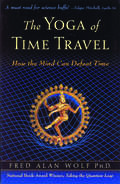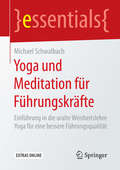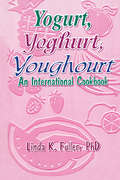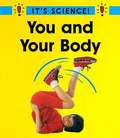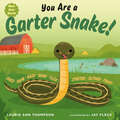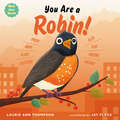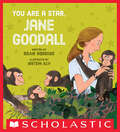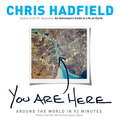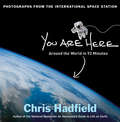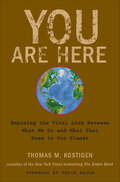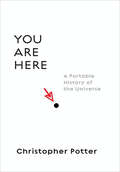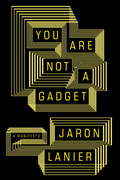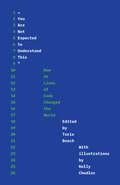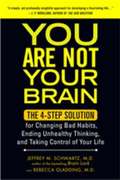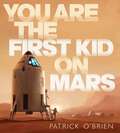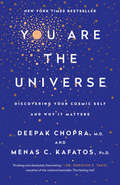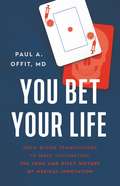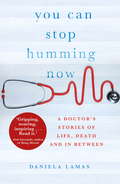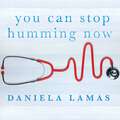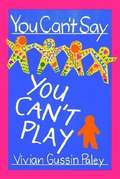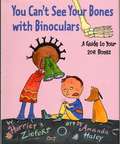- Table View
- List View
The Yoga of Time Travel
by Fred Alan WolfTime travel is not just science fiction; it may actually be possible. Wolf draws on yoga and quantum physics to show that time is a flexible projection of mind. Cheating time, he says, is an ancient metaphysical idea from the Vedas having to do with moving through meditation to a place where time stands still.
Yoga und Meditation für Führungskräfte: Einführung in die uralte Weisheitslehre Yoga für eine bessere Führungsqualität (essentials)
by Michael SchwalbachMichael Schwalbach zeigt fundiert und praxisnah, warum die uralte Weisheitslehre Yoga gerade heute für gute Führung so wertvoll ist und dass der klassische Yoga nicht nur Körperübungen, sondern auch ethische Handlungsanregungen und Meditation umfasst. Wer gut führen will, benötigt Kompetenzen für effektive Selbstführung und die Gestaltung gelingender Arbeitsbeziehungen. Der Autor beantwortet die Frage, wie Yoga auf Basis aktueller Erkenntnisse aus Hirnforschung und Psychologie die Entwicklung dieser Führungskompetenzen ermöglicht.
Yogurt, Yoghurt, Youghourt: An International Cookbook
by Linda K FullerFeaturing over 200 recipes from more than 55 countries, Yogurt, Yoghurt, Youghourt is the cookbook for today's taste- and nutrition-conscious consumer. Linda Fuller provides easy-to-follow directions for a terrific selection of yogurt-containing international recipes for a delicious new approach to cooking. Just imagine Mulligatawny Soup, Molded Pineapple Salad, Cranberried Coffeecake, Irish Soda Bread, Greek Pastitsio, Scalloped Oysters, and German Chocolate Cake--all made with yogurt. For the yogurt-lover and the yet-to-be-converted, Yogurt, Yoghurt, Youghourt is a great source of recipes that are delicious, nutritious, and low in calories. Yogurt dates back to Biblical times, and there are references to yogurt in the works of Herodotus, Homer, Pliny, Galen, and other ancient historians and physicians. For thousands of years, yogurt has survived and become a staple in many diets. And now, here is a book full of new recipes that use this ancient food in a contemporary style. Yogurt, as an outstanding supplement to a well-balanced diet, can be included in every course in a meal. For example:start off right with hors d'oeuvres or appetizers such as Guatemalan Guacamole, Crabby Hawaiian Dip, Jamaican Curried Eggs, Japanese Gingered Shrimp, or German Party Meatballscontinue with soups and salads such as Chilean Chicken-Corn Salad, Norwegian Salmon Salad, French Blueberry Bisque, Turkish Beef Soup, Creole Callaloo, and a variety of dressingsfor the main course, whether lunch, dinner, or supper, try one of these dishes: Balinese Braised Chicken, Bohemian Veal Roast, Italian Heroes, Polish Pike, Mexican Meal-in-a-Minute, and Yankee Red Flannel Hashround out meals with breads and cakes like Scottish Scones, Impeccable Pecan Muffins, Far Eastern Flat Bread, Albanian Nut Cake, Colombian Cocoa Cake, and Hussar Tortefor that finishing touch, choices include Armenian Lemon Bars, Barbados Banana Pudding, Singapore Tapioca, Guy Fawkes Fingers, Greek Apple Crisp, Cuban Cheesecake, and Southern Pecan Pieand don't forget beverages--try Austrian Apricot Frost, Hearty Health Drink, Persian Abdug, Sweet Indian Lasse, or Turkish Yogurt Fizz for thirst quenchersEach section of recipes is alphabetized, making it easy to find the recipe you want quickly. All ingredients are precisely specified, but the innovative reader/cook is encouraged to experiment with flavors and textures. Whether you are familiar with the joys of yogurt or are just beginning to learn, these recipes are sure to get your mouth watering for Yogurt, Yoghurt, Youghourt.
Yojana June 2022
by YojanaThe June 2022 edition of Yojana magazine focuses on the new - age technology. The topics discussed in the magazine are lead articles, focus on AI and special articles.
The Yokohama System for Reporting Endometrial Cytology: Definitions, Criteria, and Explanatory Notes
by Yasuo Hirai Franco FulcinitiThis book describes a standardized method for classifying and reporting invasive endometrial malignancies via direct endometrial sampling. Featuring a wealth of color illustrations, it provides specific diagnostic categories and cytomorphologic criteria to promote uniform and reliable diagnoses. It also describes the history of directly sampled endometrial cytology, reviews the sampling techniques and algorithmic approach, discusses specimen adequacy, and outlines challenges for the future. The Yokohama System for Reporting Endometrial Cytology – Definitions, Criteria and Explanatory Notes offers a valuable resource for researchers at clinical cytopathological laboratories around the world whose work involves gynecological cytology, oncology, pathology, and cytopathology. It will also appeal to researchers in the fields of cytotechnology, basic science, pathology and related industries, medical residents and clinicians.
You and Your Body
by Sally HewittFrom the muscles that move your arms and legs to the medicines you sometimes need to stay healthy, your body is very important to you. And understanding your body is something that science is all about... It's Science! is a series of books that introduces children to the science that surrounds them in their everyday world. A simple friendly text works closely with top-quality photography to open up a new area of learning. Each page is full of things for readers to notice, talk about, and try out for themselves.
You Are a Garter Snake! (Meet Your World)
by Laurie Ann ThompsonThe fourth in the adorable, STEM nonfiction picture book series that encourages very young readers to learn—through gentle interactivity and play—about the animals who share their worldStretch, slip, twist! You may haves seen a small, sleek garter snake disappear amid rocks or flowers. Did you know that garter snakes sniff with their tongues, huddle together for winter, and spray smelly stuff to scare off predators? From birth to first shedding and beyond, discover all that goes into being a garter snake in this charming picture book, the fourth in the Meet Your World series.This playful and informative series invites you to take a closer look at the amazing animals that live right alongside you in rural, suburban, and urban landscapes across North America. In each book, words and art inspire you to act out animal actions that are not so different from your own habits. And robust backmatter offers even more facts and fun. From the animals&’ families and foods to their environments and behaviors, let&’s meet your world!
You Are a Robin! (Meet Your World)
by Laurie Ann ThompsonThe third in the adorable, STEM nonfiction picture book series that encourages very young readers to learn—through gentle interactivity and play—about the animals who share their worldFlit, flap, flutter! You might have seen a robin flying overhead or heard one singing in the trees. Did you know that robins tidy themselves up, teach their babies to find food, and are almost fully grown in just two weeks? From birth to first flutter and beyond, discover all that goes into being a robin in this charming picture book, the third in the Meet Your World series.This playful and informative series invites you to take a closer look at the amazing animals that live right alongside you in rural, suburban, and urban landscapes across North America. In each book, words and art inspire you to act out animal actions that are not so different from your own habits. And robust backmatter offers even more facts and fun. From the animals&’ families and foods to their environments and behaviors, let&’s meet your world!
You Are a Star, Jane Goodall
by Dean RobbinsMake way for Jane Goodall! It's Jane Goodall like you've never seen her before!Using a unique mix of first-person narrative, hilarious comic panels, and essential facts, Dean Robbins introduces young readers to an scientific trailblazer. The second book in an exciting new nonfiction series, You Are a Star, Jane Goodall focuses on Jane's lifelong mission to understand the chimpanzees, and protect the planet.Hatem Aly's spot-on comic illustrations bring this icon to life, and engaging back matter instructs readers on how to be more like Jane!
You Are Here: Around the World in 92 Minutes
by Chris HadfieldIn You Are Here, astronaut Chris Hadfield creates a surprisingly intimate and compelling visual essay about the planet we live on, choosing the best from the thousands of photos he took on the International Space Station. Chris Hadfield's new book shows us our home--our city, country, continent, our whole planet--from a unique perspective. The millions of us who followed Chris's Twitter feed from the ISS thought we knew what we were looking at when we saw his photos. This photo documentary shows us we didn't. We caught the beauty but missed the meaning. Curated from images never before shared, Chris's big picture reveals why our planet looks the way it does and why we live where we do. Chris sees more in these images than we do, not just because he's spent months in space but because his in-depth knowledge of geology, geography and meteorology allows him to read the mysteries the photos reveal. Divided by continent, You Are Here represents one (idealized) orbit of the ISS. This planetary photo tour--surprising, playful, thought-provoking and visually delightful--is punctuated with fun, fascinating commentary on life in zero gravity, too. In the spirit of his #1 bestselling An Astronaut's Guide to Life on Earth, You Are Here opens a singular window on our planet, using remarkable photographs to illuminate the history and consequences of human settlement, the magnificence (and wit) of never-before-noticed landscapes, and the power of the natural forces shaping our world and the future of our species.
You Are Here: Around the World in 92 Minutes: Photographs from the International Space Station
by Chris HadfieldDivided by continent, YOU ARE HERE represents one (idealized) orbit of the ISS. This planetary photo tour -- surprising, playful, thought-provoking, and visually delightful -- is also punctuated with fun, fascinating commentary on life in zero gravity. In the spirit of his bestselling An Astronaut's Guide to Life on Earth, YOU ARE HERE opens a singular window on our planet, using remarkable photographs to illuminate the history and consequences of human settlement, the magnificence (and wit) of never-before-noticed landscapes, and the power of the natural forces shaping our world and the future of our species.
You Are Here
by Chris HadfieldIn You Are Here, astronaut Chris Hadfield creates a surprisingly intimate and compelling visual essay about the planet we live on, choosing the best from the thousands of photos he took on the International Space Station. Chris Hadfield's new book shows us our home--our city, country, continent, our whole planet--from a unique perspective. The millions of us who followed Chris's Twitter feed from the ISS thought we knew what we were looking at when we saw his photos. This photo documentary shows us we didn't. We caught the beauty but missed the meaning. Curated from images never before shared, Chris's big picture reveals why our planet looks the way it does and why we live where we do. Chris sees more in these images than we do, not just because he's spent months in space but because his in-depth knowledge of geology, geography and meteorology allows him to read the mysteries the photos reveal. Divided by continent, You Are Here represents one (idealized) orbit of the ISS. This planetary photo tour--surprising, playful, thought-provoking and visually delightful--is punctuated with fun, fascinating commentary on life in zero gravity, too. In the spirit of his #1 bestselling An Astronaut's Guide to Life on Earth, You Are Here opens a singular window on our planet, using remarkable photographs to illuminate the history and consequences of human settlement, the magnificence (and wit) of never-before-noticed landscapes, and the power of the natural forces shaping our world and the future of our species.
You Are Here: Exposing the Vital Link Between What We Do and What That Does to Our Planet
by Thomas M. KostigenIn this groundbreaking book, the New York Times bestselling coauthor of The Green Book Thomas M. Kostigen reveals the vital missing link in today's environmental crisis: how we as individuals are connected to the most tenuous geography on the planet. Despite the recent prominence of "green" issues in the news, the direct relationship between our actions and the earth is too often ignored. But the seemingly insignificant things we do every day have the power to literally alter the landscape in the ongoing battle to resuscitate the planet.
You Are Here: A Portable History of the Universe
by Christopher Potter“You Are Here is not just physics for poets, but as close to poetry or music as science is ever likely to get. Christopher Potter’s narrative is as imaginative, ingenious, and elegantly concise as it is user-friendly.” — Sylvia Nasar, author of A Beautiful Mind“A personal, brilliant, and often amusing account . . . . An idiosyncratic, encyclopedic blitzkrieg of a book.” —The Boston Globe“The Verdict: Read.” — TimeChristopher Potter’s You Are Here is a lively and accessible biography of the universe—how it fits together and how we fit into it—in the style of science writers like Richard Dawkins, Bill Bryson, and Richard Feynman, as seen through the lens of today’s most cutting-edge scientific thinking.
You Are Not a Gadget: A Manifesto
by Jaron Lanier'Jaron Lanier's long-awaited book is fabulous - I couldn't put it down and shouted out Yes! Yes! on many pages. Lanier is a rare voice of sanity in the debate about the relationship between computers and we human beings. He convincingly shows us that the idea of digital computers having human-like intelligence is a fantasy - computers are tools and toys and, like musical instruments, are created by us to enhance our humanity. But when they are badly designed they diminish our individuality, freedom and humanity. This is a landmark book that will have people talking and arguing for years into the future' Lee SmolinSomething went wrong around the start of the twenty-first century. Individual creativity began to go out of fashion. Music became an endless rehashing of the past. Scientists were in danger of no longer understanding their own research. Indeed, not only was individual creativity old-fashioned but so were individuals themselves. The crowd was wise. Machines, specifically computers, were no longer tools to be used by human minds - they were better than humans. Welcome to the world of the digital revolution. Yet what if, despite web 2. 0, despite OpenSource, despite the wisdom of crowds, and the creation of Wikipedia, only people are meaningful? After all, when the printing press was invented, the mechanism was ultimately less impressive than the authors. What if, by devaluing individuals, we are deadening creativity, endlessly rehashing past culture, risking weaker design in engineering and science, losing democracy, and reducing development - in every sphere?In You Are Not a Gadget, Jaron Lanier, digital guru and pioneer of Virtual Reality, delivers a searing manifesto in support of the human and reflects on the good and bad developments in design and thought twenty years after the invention of the web. Controversial and fascinating, You Are Not a Gadget is a deeply felt defence of the individual from an author uniquely qualified to comment on the way technology interacts with our culture.
"You Are Not Expected to Understand This": How 26 Lines of Code Changed the World
by Kelly ChudlerLeading technologists, historians, and journalists reveal the stories behind the computer coding that touches all aspects of life—for better or worseFew of us give much thought to computer code or how it comes to be. The very word “code” makes it sound immutable or even inevitable. “You Are Not Expected to Understand This” demonstrates that, far from being preordained, computer code is the result of very human decisions, ones we all live with when we use social media, take photos, drive our cars, and engage in a host of other activities.Everything from law enforcement to space exploration relies on code written by people who, at the time, made choices and assumptions that would have long-lasting, profound implications for society. Torie Bosch brings together many of today’s leading technology experts to provide new perspectives on the code that shapes our lives. Contributors discuss a host of topics, such as how university databases were programmed long ago to accept only two genders, what the person who programmed the very first pop-up ad was thinking at the time, the first computer worm, the Bitcoin white paper, and perhaps the most famous seven words in Unix history: “You are not expected to understand this.”This compelling book tells the human stories behind programming, enabling those of us who don’t think much about code to recognize its importance, and those who work with it every day to better understand the long-term effects of the decisions they make.With an introduction by Ellen Ullman and contributions by Mahsa Alimardani, Elena Botella, Meredith Broussard, David Cassel, Arthur Daemmrich, Charles Duan, Quinn DuPont, Claire L. Evans, Hany Farid, James Grimmelmann, Katie Hafner, Susan C. Herring, Syeda Gulshan Ferdous Jana, Lowen Liu, John MacCormick, Brian McCullough, Charlton McIlwain, Lily Hay Newman, Margaret O’Mara, Will Oremus, Nick Partridge, Benjamin Pope, Joy Lisi Rankin, Afsaneh Rigot, Ellen R. Stofan, Lee Vinsel, Josephine Wolff, and Ethan Zuckerman.
You Are Not Your Brain
by Rebecca Gladding Jeffrey SchwartzTwo neuroscience experts explain how their 4-Step Method can help break destructive thoughts and actions and change bad habits for good. A leading neuroplasticity researcher and the coauthor of the groundbreaking books Brain Lock and The Mind and the Brain, Jeffrey M. Schwartz has spent his career studying the structure and neuronal firing patterns of the human brain. He pioneered the first mindfulness-based treatment program for people suffering from OCD, teaching patients how to achieve long-term relief from their compulsions. For the past six years, Schwartz has worked with psychiatrist Rebecca Gladding to refine a program that successfully explains how the brain works and why we often feel besieged by bad brain wiring. Just like with the compulsions of OCD patients, they discovered that bad habits, social anxieties, self-deprecating thoughts, and compulsive overindulgence are all rooted in overactive brain circuits. The key to making life changes that you want-to make your brain work for you-is to consciously choose to "starve" these circuits of focused attention, thereby decreasing their influence and strength. As evidenced by the huge success of Schwartz's previous books, as well as Daniel Amen's Change Your Brain, Change Your Life, and Norman Doidge's The Brain That Changes Itself, there is a large audience interested in harnessing the brain's untapped potential, yearning for a step-by-step, scientifically grounded and clinically proven approach. In fact, readers of Brain Lock wrote to the authors in record numbers asking for such a book. In You Are Not Your Brain, Schwartz and Gladding carefully outline their program, showing readers how to identify negative brain impulses, channel them through the power of focused attention, and ultimately lead more fulfilling and empowered lives.
You Are Not Your Brain
by Jeffrey Schwartz Rebecca GladdingTwo neuroscience experts explain how their 4-Step Method can help identify negative thoughts and change bad habits for good. A leading neuroplasticity researcher and the coauthor of the groundbreaking books Brain Lock and The Mind and the Brain, Jeffrey M. Schwartz has spent his career studying the human brain. He pioneered the first mindfulness-based treatment program for people suffering from OCD, teaching patients how to achieve long-term relief from their compulsions.Schwartz works with psychiatrist Rebecca Gladding to refine a program that successfully explains how the brain works and why we often feel besieged by overactive brain circuits (i.e. bad habits, social anxieties, etc.) the key to making life changes that you want--to make your brain work for you--is to consciously choose to "starve" these circuits of focused attention, thereby decreasing their influence and strength.You Are Not Your Brain carefully outlines their program, showing readers how to identify negative impulses, channel them through the power of focused attention, and ultimately lead more fulfilling and empowered lives.
You Are the First Kid on Mars
by Patrick O'BrienAs we look back to the beginnings of the space race, 2009 is also the year for looking forward to humankind?s next step toward the stars. In the spirit of books that once imagined colonies on the moon, Patrick O?Brien has created a unique look at your first trip to Mars. Using the most upto- date designs and theories of what it will take to establish a base on Mars, you are off on an incredible journey, over 35 million miles to the red planet. Filled with details, and vividly brought to life, this is an adventure that you are never going to forget.
You Are the Universe: Discovering Your Cosmic Self and Why It Matters
by Deepak Chopra Menas C. Kafatos<P>New York Times bestselling author Deepak Chopra joins forces with leading physicist Menas Kafatos to explore some of the most important and baffling questions about our place in the world. <P> What happens when modern science reaches a crucial turning point that challenges everything we know about reality? In this brilliant, timely, and practical work, Chopra and Kafatos tell us that we've reached just such a point. In the coming era, the universe will be completely redefined as a "human universe" radically unlike the cold, empty void where human life is barely a speck in the cosmos. <P>You Are the Universe literally means what it says--each of us is a co-creator of reality extending to the vastest reaches of time and space. This seemingly impossible proposition follows from the current state of science, where outside the public eye, some key mysteries cannot be solved, even though they are the very issues that define reality itself: What Came Before the Big Bang? Why Does the Universe Fit Together So Perfectly? Where Did Time Come From? What Is the Universe Made Of? Is the Quantum World Linked to Everyday Life? Do We Live in a Conscious Universe? How Did Life First Begin? <P> “The shift into a new paradigm is happening,” the authors write. “The answers offered in this book are not our invention or eccentric flights of fancy. All of us live in a participatory universe. Once you decide that you want to participate fully with mind, body, and soul, the paradigm shift becomes personal. The reality you inhabit will be yours either to embrace or to change.” What these two great minds offer is a bold, new understanding of who we are and how we can transform the world for the better while reaching our greatest potential. <P><b>A New York Times Bestseller</b>
You Bet Your Life: From Blood Transfusions to Mass Vaccination, the Long and Risky History of Medical Innovation
by Paul A OffitOne of America&’s top physicians traces the history of risk in medicine—with powerful lessons for today Every medical decision—whether to have chemotherapy, an X-ray, or surgery—is a risk, no matter which way you choose. In You Bet Your Life, physician Paul A. Offit argues that, from the first blood transfusions four hundred years ago to the hunt for a COVID-19 vaccine, risk has been essential to the discovery of new treatments. More importantly, understanding the risks is crucial to whether, as a society or as individuals, we accept them. Told in Offit&’s vigorous and rigorous style, You Bet Your Life is an entertaining history of medicine. But it also lays bare the tortured relationships between intellectual breakthroughs, political realities, and human foibles. Our pandemic year has shown us, with its debates over lockdowns, masks, and vaccines, how easy it is to get everything wrong. You Bet Your Life is an essential read for getting the future a bit more right.
You Can Stop Humming Now: A Doctor's Stories of Life, Death and in Between
by Dr. Daniela Lamas'Gripping, soaring, inspiring . . . Read it' - Atul Gawande, author of the international bestseller Being Mortal'You Can Stop Humming Now is essential reading on what it means to be human in an age of medical technology. I couldn't put it down' - Alexandria Marzano-Lesnevich, author of The Fact of a Body'In turns anguishing, gripping, and hopeful, You Can Stop Humming Now is a must-read for anyone contemplating what medicine holds in store for us.' - Danielle Ofri, MD, PhD, author of What Patients Say, What Doctors FeelModern medicine is a world that glimmers with new technology and cutting-edge research. To the public eye, medical stories often begin with sirens and flashing lights and culminate in survival or death. But these are only the most visible narratives. As a critical care doctor treating people at their sickest, Daniela Lamas is fascinated by a different story: what comes after for those whose lives are extended by days, months, or years as a result of our treatments and technologies?In You Can Stop Humming Now, Lamas explores the complex answers to this question through intimate accounts of patients and their families. A grandfather whose failing heart has been replaced by a battery-operated pump; a salesman who found himself a kidney donor on social media; a college student who survived a near fatal overdose and returned home, alive but not the same; and a young woman navigating an adulthood she never thought she'd live to see-these moving narratives paint a detailed picture of the fragile border between sickness and health.Riveting, beautifully told, and deeply personal, You Can Stop Humming Now is a compassionate, uncompromising look at the choices and realities that many of us, and our families, may one day face.
You Can Stop Humming Now: A Doctor's Stories of Life, Death and in Between
by Dr. Daniela Lamas'Gripping, soaring, inspiring . . . Read it' - Atul Gawande, author of the international bestseller Being Mortal'You Can Stop Humming Now is essential reading on what it means to be human in an age of medical technology. I couldn't put it down' - Alexandria Marzano-Lesnevich, author of The Fact of a Body'In turns anguishing, gripping, and hopeful, You Can Stop Humming Now is a must-read for anyone contemplating what medicine holds in store for us.' - Danielle Ofri, MD, PhD, author of What Patients Say, What Doctors FeelModern medicine is a world that glimmers with new technology and cutting-edge research. To the public eye, medical stories often begin with sirens and flashing lights and culminate in survival or death. But these are only the most visible narratives. As a critical care doctor treating people at their sickest, Daniela Lamas is fascinated by a different story: what comes after for those whose lives are extended by days, months, or years as a result of our treatments and technologies?In You Can Stop Humming Now, Lamas explores the complex answers to this question through intimate accounts of patients and their families. A grandfather whose failing heart has been replaced by a battery-operated pump; a salesman who found himself a kidney donor on social media; a college student who survived a near fatal overdose and returned home, alive but not the same; and a young woman navigating an adulthood she never thought she'd live to see-these moving narratives paint a detailed picture of the fragile border between sickness and health.Riveting, beautifully told, and deeply personal, You Can Stop Humming Now is a compassionate, uncompromising look at the choices and realities that many of us, and our families, may one day face.
You Can't Say You Can't Play
by Vivian Gussin PaleyWho of us cannot remember the pain and humiliation of being rejected by our classmates? However thick-skinned or immune to such assaults we may become as adults, the memory of those early exclusions is as palpable to each of us today as it is common to human experience. We remember the uncertainty of separating from our home and entering school as strangers and, more than the relief of making friends, we recall the cruel moments of our own isolation as well as those children we knew were destined to remain strangers.<P> In this book Vivian Paley employs a unique strategy to probe the moral dimensions of the classroom. She departs from her previous work by extending her analysis to children through the fifth grade, all the while weaving remarkable fairy tale into her narrative description. Paley introduces a new rule-"You can't say you can't play"-to her kindergarten classroom and solicits the opinions of older children regarding the fairness of such a rule. We hear from those who are rejected as well as those who do the rejecting. One child, objecting to the rule, says, "It will be fairer, but how are we going to have any fun?" Another child defends the principle of classroom bosses as a more benign way of excluding the unwanted.<P> In a brilliant twist, Faley mixes fantasy and reality, and introduces a new voice into the debate: Magpie, a magical bird, who brings lonely people to a place where a full share of the sun is rightfully theirs. Myth and morality begin to proclaim the same message and the schoolhouse will be the crucible in which the new order is tried. A struggle ensues and even the Magpie stories cannot avoid the scrutiny of this merciless pack of social philosophers who will not be easily caught in a morality tale.<P> You Can't Say You Can't Play speaks to some of our most deeply held beliefs. Is exclusivity part of human nature? Can we legislate fairness and still nurture creativity and individuality? Can children be freed from the habit of rejection? These are some of the questions. The answers are to be found in the words of Paley's schoolchildren and in the wisdom of their teacher who respectfully listens to them.
You Can't See Your Bones With Binoculars: A Guide To Your 206 Bones
by Harriet ZiefertText and illustrations, including x-rays, provide a guided tour of the human skeleton, encouraging the reader to find and feel each bone as it is described.
